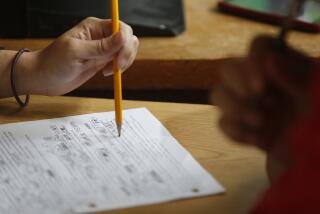Psychologist Tells of Memory’s Tricks
- Share via
ROCHESTER, N.Y. — Memory, it’s been said, is the thing you forget with. Or, as playwright Harold Pinter once commented, “The past is what you remember, imagine you remember, convince yourself you remember, or pretend to remember.”
A University of Rochester psychologist who has studied the way people recall their experiences agrees that indeed, when people think about their past, their memories are anything but reliable.
“What we might call autobiographical memories are different from the mind’s data storage capacity for things like phone numbers, state capitals, or the Pledge of Allegiance,” Craig Barclay says.
Many people think of memory as a file cabinet that stores facts ready for retrieval, or as a videocassette recorder with instant replay.
People Edit Memories
But Barclay contends that when we try to recall things past, our memory behaves more like a historian writing a biography: Just as the author sifts through his subject’s past, highlighting some events and downplaying others, so do individuals freely edit personal memories.
Thus, the old man who was a bench warmer for his high school football team may now vividly recall his glories on the gridiron.
In one of his first studies about memory, Barclay asked six adults to keep a diary of three events daily for four months, then turn over the diary to him. Over the next 2 1/2 years, Barclay tested them on what they had written. Each test included some of the subject’s original records of events, some “foils”--original records that Barclay altered--and a few totally fictitious events.
“Generally, they were able to identify their original records with precision over the course of the study,” Barclay says. “And they also rejected false memories--at first. But after five months, while they continued to identify correctly their own records, they began to accept false memories as their own, with a relatively high level of confidence.”
More recently, Barclay looked at how accuracies and inaccuracies in autobiographical memories may be tied to people’s attitudes and beliefs about themselves. A study to be published later this year compared women with Premenstrual Syndrome to a control group not subject to PMS.
Mood Affects Memory
The research supported the claim that mood does interact with our attitudes and beliefs about ourselves to affect our memories. For example, when tested, PMS subjects were found to be more error-prone than the control group in distinguishing between original records and altered ones. (Barclay theorized that PMS subjects were distracted by mood swings and thus stored less specific information.)
However, the control group--people who in psychological tests showed that they had a more positive view of themselves--had trouble remembering negative events in their past. In other words, thinking positively about oneself isn’t just a self-fulfilling prophecy, it can be a self-fulfilling “history” as well. Barclay terms the phenomenon the “Pollyanna Syndrome.”
Even “flashbulb” memories--those pictures we carry around in our heads of what happened on an important day--are subject to distortion, Barclay says.
“People have shown that, even though these memories seem extremely vivid after many years, they can be quite inaccurate. A researcher at the University of Utah tells the story of one of her colleagues who said, years after President Kennedy was killed, ‘I know that you came down to my office and told me about what you had heard on the news.’ She went back and checked, and she had been in Washington that day.”
The study of memory as it occurs in real life, and how it may be linked to what sort of person we believe ourselves to be, is a relatively unexplored field for psychologists, Barclay says. But the phenomenon of memory has interested human beings through the centuries, and writers from Shakespeare to Proust have explored it.
“Most of my ideas have come from literary criticism, not from psychology,” Barclay says. “I think writers have understood memory for a much longer time than psychologists.”


